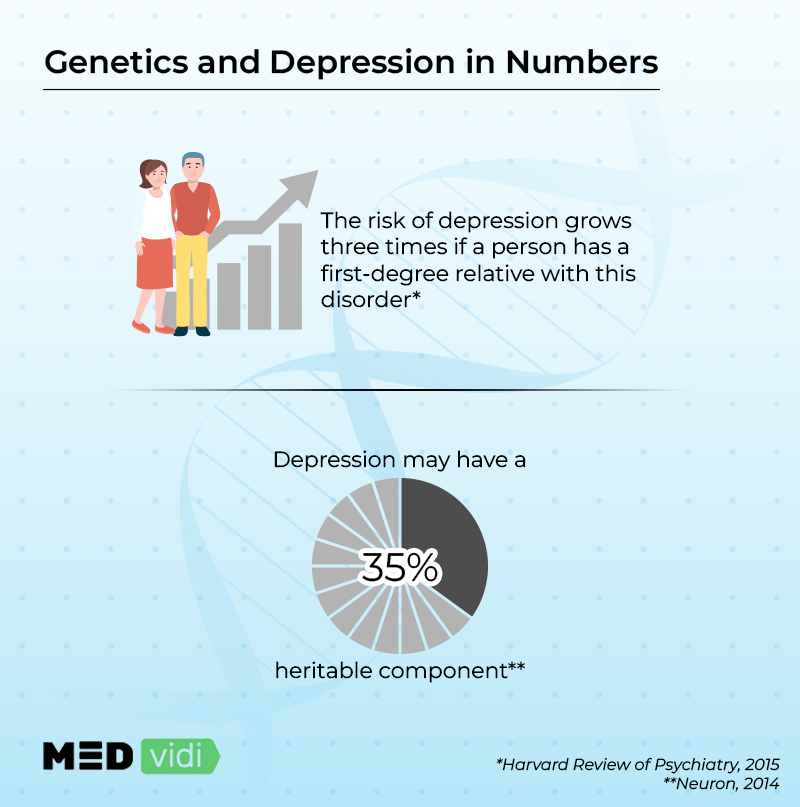Depression is the most prevalent mental health condition that affects millions of people. There are many different risk factors for developing this complex mental disorder, and one of the elements that can cause depression is genetics. However, although you might be more prone to depression due to your genes, the condition may not occur if other factors will balance it. Or, it may develop because of other causes.
So, is depression genetic, to which extent, and what other aspects can lead to this disorder? These are difficult questions to answer, and much more information must be added to the existing studies. Here, we’ve gathered the latest relevant information to provide you with an insight into the genetics of depression and help you better understand this connection.
Do you find it difficult to cope with your depression? Seek help from a mental health professional.
Can Depression Be Genetic?
As per the
However, the root cause of each person’s depression symptoms may be different. There may be other factors that contribute to the disorder. To make the concept more understandable, the causes of depression are split into two major groups:
- Environmental. This group incorporates financial, occupational, social, and interpersonal pressure somebody might experience. If the person is all under prolonged strain or stress, they can both exacerbate and induce depression.
- Genetic predisposition. When they experience enough psychological stress, persons with family members who suffer from depression become more prone to the condition and are more likely to develop it.
What Does the Research Say?
- According to some
research[2] , a person may be three times more likely than the general population to be diagnosed with depression in their lifetime if they have a first-degree relative who has the disorder (a parent, sibling, or child). As per another source, the risk may be 4 or 5 times higher if a person’s parent or sibling has had multiple depressive episodes, especially if they began earlier in life (anytime from their childhood to their 20s). - According to another study, depression may have a 37% heritable component.
- Also, some
studies[3] have suggested that women may be more vulnerable than men to the genetic variables linked to depression.
A mental health expert can help you determine the root cause and action plan for your depression symptoms.
Which Genes Contribute to Depression Heredity?
Depression doesn’t have one particular gene only associated with it. However, a study conducted by the University of Edinburgh found that genes largely influence depression. According to an update, 269 genes and 102 gene variations are linked to depression. Scientists collected and analyzed data on two million people in 20 countries. Genes affect the nerve connections in the areas of the brain responsible for personality and decision-making. The likelihood of experiencing depression increases with variance.
The following are examples of how some
- The role of polymorphisms in genes linked to serotonin, noradrenaline, and dopamine neurotransmission, is one example of potential genetic influences. Depression is predisposed by serotonin transporter genes that prevent serotonin reuptake, resulting in a deficiency of monoamines in the brain.
- The variation in genes that control the activity of the hypothalamic-pituitary-adrenal (HPA) axis, which is stimulated by stress, is another possibility of genetic influence. In some people, hyperactivity of the HPA axis may be a factor in developing depression.
- The body releases some anti-inflammatory molecules in response to inflammatory conditions, which can act on the brain to trigger depressive symptoms. The onset of depression in this case may be influenced by genes that control these molecules.
- Another potential factor in the inherited vulnerability to depression is the sleep/wake cycle-regulating genes, which can disrupt healthy sleep and several other bodily processes that rely on the biological clock. Disturbed sleep plays a major role as a risk factor for the onset of depression.
Take the depression test online. Check the severity of your symptoms.

Common Depression Symptoms to Pay Attention to
Although the symptoms of depression differ from person to person, there are some universal ones. It’s crucial to remember that these symptoms can be a part of the typical bad points in life. However, the likelihood that you are experiencing depression increases with the number, intensity, and duration of your symptoms. Hence, be aware of the signs listed below if you have a family history of the illness.
- Low mood
- A sense of hopelessness and despair
- Self-loathing
- Loss of interest in routine activities
- A decrease in energy
- Impaired concentration
- Changes in weight or appetite
- Sleep changes
- Unexplained aches and discomfort
- Difficulty with focus
To Conclude
So, is depression genetic? In short, we can say yes. The fact that depression tends to run in families suggests that hereditary factors may increase the likelihood of getting the condition. Some people are predisposed to depression genetically from birth. However, this does not guarantee they will experience depression. Similarly, it does not imply that somebody with a different genetic makeup is immune to the disease forever. Others may experience depression due to environmental factors; occasionally, it results from combining both factors. Yet, a depressed episode needs a trigger from the environment to begin.
To be on the correct path to recovery, it is preferable to discuss your symptoms with a mental health professional.













